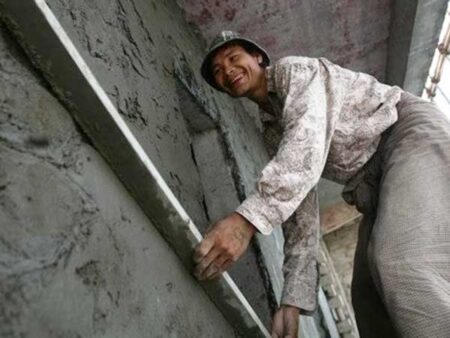
A Crisis Line That Calms With Texting and Data
Anxiety, suicidal ideation, and depression are all alarmingly prevalent amongst Americans. Crisis Text Line lets you text immediately with a
Building Markets supports businesses across many sectors in accessing new market opportunities.
Radha Rajkotia of Building Markets spoke with Erica J. Edwards on March 9, 2023. Click here to read the full conversation with insights highlighted.
Erica Edwards: Can you introduce yourself and the organization that you represent and a little bit more about what you guys do?
Radha Rajkotia: I’m Radha Rajkotia, and I’m with Building Markets. Building Markets is a nonprofit focused on supporting small businesses that are led by people from disadvantaged communities. By disadvantaged communities, we really mean people who are typically excluded from kind of high value market access opportunities. That can be women, it can be minorities, it can be refugees and migrants. Our core goal is to make sure that they are able to access more lucrative market opportunities, whether that comes from export, whether it comes from procurement opportunities or just investments. Currently we work in Turkey with 2,500 businesses predominantly led by Syrian refugees. We also work in Myanmar, with the people who are obviously living under intense kind of political oppression right now. We’re just opening an office in Columbia, where we’ll be working with people who have been forcibly displaced. So either Venezuelan migrants or those people who have been internally displaced from conflict areas within Columbia.
We know that there is deep inequality in the world in terms of who is able to access economic opportunity. Within that, what we see is the effects of that inequality are long-lasting. Even in the US it will take five generations for a child who’s born into a low income family to reach average income levels. That’s a huge cost and that doesn’t account for the health, education, welfare costs that those generations are going to be struggling with. We also know that formal employment is a strong route out of that vulnerability and exclusion and poverty. What we do is work with small businesses because small businesses are the largest employers globally – they employ 70% and create 70% of jobs across the globe. We work with small businesses to access stronger market opportunities so that they can grow and sustain and create jobs.
Erica Edwards: When you say you work with small businesses, are you helping artisans work with small businesses?
Radha Rajkotia: We work with formal businesses, they’re often micro and small. It can often be between 5 to 20 employees and they work in a whole range of sectors. They can work in food and beverage, they can work in construction, in engineering, in architecture, in translation services, IT services, a whole range of sectors. What we do with them is we look to see where it is that there are market opportunities that they’re not accessing. For instance, in a lot of places there are tons of procurement opportunities, whether it is governments putting out procurement opportunities or larger corporations who are looking for certain kinds of suppliers or small businesses to provide certain services. But a lot of these small businesses don’t have the capacity or know-how or the bandwidth to be able to do these really difficult, often full of red tape processes to apply for these bids.
What we do is we make it easy for them. We identify tenders that would be relevant for them and we help them through the process of actually putting together a successful bid. Our success is really measured in terms of contracts that they win. We really want to be able to see for this small input in, what’s the kind of value of the contracts that you are now getting because that contract then translates into work, which translates into jobs for people.
Erica Edwards: What makes your approach distinctive or unique for the problem that you’re solving?
Radha Rajkotia: Most of the work that’s geared towards small business development is really often geared towards human capital development. Do people know how to manage their businesses? Are they well-trained? It’s a lot of training programs or consulting programs to help them with management to help them with financial management or business planning. There’s a lot of interventions and a lot of policies that are really good towards providing great access to finance. Most frameworks for small and medium size enterprise development is human capital development, a second pillar around access to finance, and a third pillar around market access. You very rarely see a focus just on market access.
Our assumption is that even a business that doesn’t have the best financial management practices, or doesn’t have the best management practices, if you give them a lucrative enough opportunity, they’ll work it out. They’ll work out how to respond, they’ll work out what they need to do to get in place with their staffing, to be able to respond to something that is promising for them. Our focus on market access is pretty unique in the small and medium enterprise space.
Erica Edwards: Can you share one example that illustrates the impact of your work?
Radha Rajkotia: We have a program with Syrian refugee led businesses in Turkey. Turkey’s actually a pretty great environment for refugees in terms of work and doing business. It’s a very negative environment from a political and social perspective, though, there’s a lot of xenophobia, a lot of blame placed on refugees for a number of different kinds of social issues in the country. Syrians don’t feel welcomed, but they are able to at least live and work well. We work there predominantly with Syrian refugees trying to make sure that they have access to these lucrative market opportunities.
We work with them on pursuing procurement opportunities, so those would be from the government and from the aid sector. Right now with the earthquake that’s just happened in Turkey, all of those aid flows that are going into the country, they need actors on the ground to be able to actually respond and deliver services. We have 75 restaurants in our network who are responding and providing food and mobile kitchens to people who have lost their homes, for instance. We also do a lot of work around exports. It’s super interesting because in the areas where we are working, the Syrian refugees export at twice the rate of Turkish people. They have huge networks and outlets in the Middle East region, in the Gulf and in Europe, because they’re using these kinds of transnational networks. They’re diaspora networks of other Syrians who have also left as a result of the crisis.
What we’re able to do is really take advantage of their language and cultural links, and we support them to create new opportunities. Using these kinds of approaches over time in a number of different countries, we’ve generated about $1.3 billion in contracts and 74,000 jobs. The other example I wanted to share was in Liberia where we did similar work. We did a randomized control trial of that work to look at businesses who were able to access our procurement support and then others who had not. Those who were able to access it actually tripled the number of international contracts that they were able to win. And it was long-lasting. It lasted three years out. It’s a very small and simple way of providing support. We’ve unlocked a capability that’s pretty simple and then that just keeps them going for a while. So it’s pretty cool.
Erica Edwards: What insights or teachable lessons can be taken from your work that you believe other people can use?
Radha Rajkotia: There’s a couple of insights. One is drawing on the strength that market actors already have. We don’t approach our work from a deficit lens. We don’t look at it as these poor firms, they don’t know how to do these things. Instead, we say, “If you’ve never exported before, there’s no reason why you would know how to do that. So let us help you.” It’s not a deficit. It’s not a flaw that you have. It’s just unlocking something that is a simple information gap, and a simple opportunity gap. We’re unlocking something that’s pretty straightforward, but using a more positive frame and approach to thinking about how businesses and small firms are able to use that innate kind of creativity, urgency, entrepreneurial skill that they have. Giving them one simple support so that they can go with it. The insight is to not focus on the things that these businesses or firms don’t have, but instead look at how you can make something easier and then they will use all of the creativity and assets that they do have to rise to that.
Erica Edwards: How do you measure success and what is the evidence that you’re making progress?
Radha Rajkotia: We take data and data use really seriously. We track everything. We track how we’re engaging every small business that we’re working with. We track what kinds of opportunities we are sharing with them, what they’re going for, what they’re not going for and why. When are they successful, when are they not successful and why? How does this look for women versus male led businesses? We track a number of things and from that we can course correct and rethink our strategies and the kind of support that we need to provide on an ongoing basis. Ultimately, our goals are around values of contracts that we’re securing and the jobs that are created or sustained through that process. We keep that as a clock that’s running, that we’re constantly looking at, so we can see over time when things are ebbing and flowing and try and understand why that’s the case.
In addition to that, we will spend time and we’ll invest more heavily on specific questions or issues that we want to drill into. As I mentioned, we did the randomized control trial in Liberia to understand the real value of our program in a very rigorous way. We’ll do something similar in Turkey now to understand not just the contracts, but also what these relationships and these transactions mean in terms of social cohesion. We will look at additional social benefits, we hope, that are coming out of these economic outcomes that we’re looking at.
Erica Edwards: Have there been any social benefits of note so far?
Radha Rajkotia: Oh, absolutely. We want to look at it more rigorously, but I think the things that we see from a more qualitative perspective are at that individual business owner level. You can imagine the amount of stress that a lot of business owners [feel], and especially if you’re a Syrian refugee in Turkey post-earthquake, it’s unbelievable levels of stress. Being able to focus on positive contributions, getting people to work doing what it is that they know how to do, and supporting them to do that, and getting them back on their feet again, there’s an enormous amount of benefit just from reducing their anxiety and stress and giving them something that’s like a positive market opportunity to focus on. It’s a way of helping with what’s going on.
We also see really positive effects in terms of people’s self-esteem. You see this a lot for women in particular that their position in their societies and their communities adjusts in a positive way. You can also see it in terms of the wellbeing of their kids. When we talk about 2,500 small businesses in our network in Turkey, that’s 135,000 family members between the business owners and their employees and their households. That’s a lot of people who are reliant on these businesses. They’re all impacted by the success or failure of what’s going on.
Erica Edwards: Every social change model has strengths and limitations. What do you see as the main limitations of your work?
Radha Rajkotia: There’s not a lot of funding for support to small businesses. I would actually say that the constraint to scale is not inherent in the model of what we are doing because there is a way to scale that. There are a number of different ways that we can deploy the work in a scalable way, both market based and non-market based. When you look at what’s going on in the development sector in particular, there is not a great understanding of why small businesses matter. From a funder perspective, people care about women, they care about migrants, they care about individuals living in poverty. There’s not a lot of interest necessarily in small businesses as a subset so I think that’s a challenge that we have in terms of scalability. When there is a need for grant financing, being able to find sufficient grant financing for that.
Erica Edwards: How are you catalyzing change in your field? How are you working to advance system level change in your field?
Radha Rajkotia: There is a really strong push in international development to localize where decisions are made, to localize where funds are sent, from an international aid perspective. A lot of that focuses on local nonprofits and local community led organizations, which is awesome. What we want to do is make sure that local businesses are also part of that conversation because they are such a core part of how markets function and how aid is delivered and where resources and capabilities lie. We like to take the sort of localization agenda and try to be more inclusive of really thinking about the local private sector, not just public sector or community service organizations.
Erica Edwards: Every social change effort learns from failure along the way. Can you describe a mistake or failure that occurred in your work? And most importantly, what lessons did you learn from it that others could benefit from hearing about?
Radha Rajkotia: I think we probably spent too long developing proof of concept and didn’t think early enough about how to scale. Scale and sustainability, I would say historically, were a bit more of an afterthought for us. First, can we actually test that this works? Can we see that we could actually derive results in this location? And then we would think, “Oh, and how are we going to sustain this? How are we going to scale this going forward?” And that’s too late. Scale and sustainability needs to be part of the process from the outset. As soon as we’re entering a new market, it should underpin everything that we do in terms of how we work, how we operate.
Erica Edwards: What do you think is most needed from partners to advance system level change?
Radha Rajkotia: We are operating, as I mentioned, within the framework of human capital, access to finance, market access, and then obviously the policy environment. We are really focused on the market access pillar, but we know that what’s really going to be necessary is for the actors that are in these three pillars to be integrated, so that we have an integrated push in terms of what we’re offering small businesses. partnership is core to what we’re doing, so being able to have alignment around what the most effective ways are of working with these small businesses and working in lockstep so that the financing matches what we’re seeing in terms of the financing needs when it’s the access to market piece. I’ll give you an example, procurement is hard for small businesses, not only because it’s a headache and full of red tape and really bureaucratic, and they have so many things going on, applying for these really challenging submissions is difficult.
That’s one thing. The other big barrier or constraint that they face is that normally they only get invoiced and paid afterwards, once they’ve completed the work. There’s a basic really simple cash flow issue, a working capital issue, and most financial institutions don’t want to pay for working capital, that’s risky. They would be happy to do investment, debt/equity, all of these other kinds of financing, but working capital is not very attractive to financial institutions. One of the things that we need to be able to do is come up with new ways where we can really bring what the value is of these market opportunities and use that as a way to also design and develop and deliver some financial products that would help small businesses. I think there’s a partnering sort of ecosystem push that’s needed where it really takes into consideration all of these three pillars and what will help tie them together.
Erica Edwards: How do you see your work evolving over the next five years?
Radha Rajkotia: When you think about the pathway to scale, we are in the phase where we’re beyond proof of concept. We’re in a heavy kind of replication with an intentional learning around what’s the best way to deliver our model at scale. We’re focusing pretty heavily on partnerships, on technology, on really trying to understand these different market segments in the small business community that we’re looking at. So what does it mean to work with women versus refugees, which might require us to have different approaches. We’re doing this very intentional learning and testing over the next couple of years with a view to then be able to scale. The other piece is making the transition from a nonprofit model to a social enterprise model with more diverse revenue sources, because that’s also been a constraint to our growth and our financial sustainability.
Erica Edwards: Can you talk about how those two things differ, a social enterprise model versus a nonprofit model?
Radha Rajkotia: Our funds all come to us from funders. It’s one directional. The funders give us money and we deliver programs to small businesses. What we want to see is more of a social enterprise model where we can have grant funds coming to us, but we can also receive payment for services from either the small businesses that we’re working with or others for the services that we’re providing so that there’s a flow of financing in different directions. It’s not all just one directional. That would allow us to operate in some ways more like a business and in other ways still like a nonprofit.
Erica Edwards: Thank you so much for your time and all the work that you do.
Click here to read the full conversation with insights highlighted.
Erica J. Edwards is a multimedia journalist based in NYC. She has worked at New York Public Radio, WTAE, WMUR, and the Mayor’s Office of Media and Entertainment (MOME). Edwards was a LEDE Fellow within the Solutions Journalism Network. She is deeply passionate about bringing solutions journalism to the forefront of the public’s news diet through social media.
* This interview has been edited and condensed.
Find other social change organizations working with small businesses.


Anxiety, suicidal ideation, and depression are all alarmingly prevalent amongst Americans. Crisis Text Line lets you text immediately with a

AstroX (Astronautical Association of Malaysia) is increasing science education and engagement in Malaysia. One of the first efforts was bringing

Reach Digital Health is building a world where everyone has access to health services and products. They are using technology

Civic Nation is a nonprofit ecosystem that runs high-impact organizing and education initiatives around issues related to democracy, gender equity,

The Global Steering Group for Impact Investment is catalyzing impact investment and entrepreneurship to benefit people and the planet. It

VillageReach transforms health care delivery so that each person has the health care needed to thrive. VillageReach focuses on building